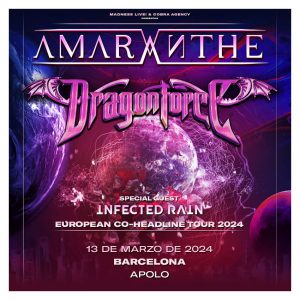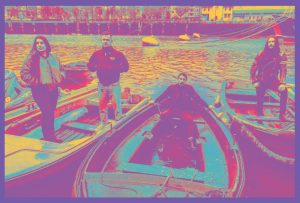THE BABOON SHOW (EN)
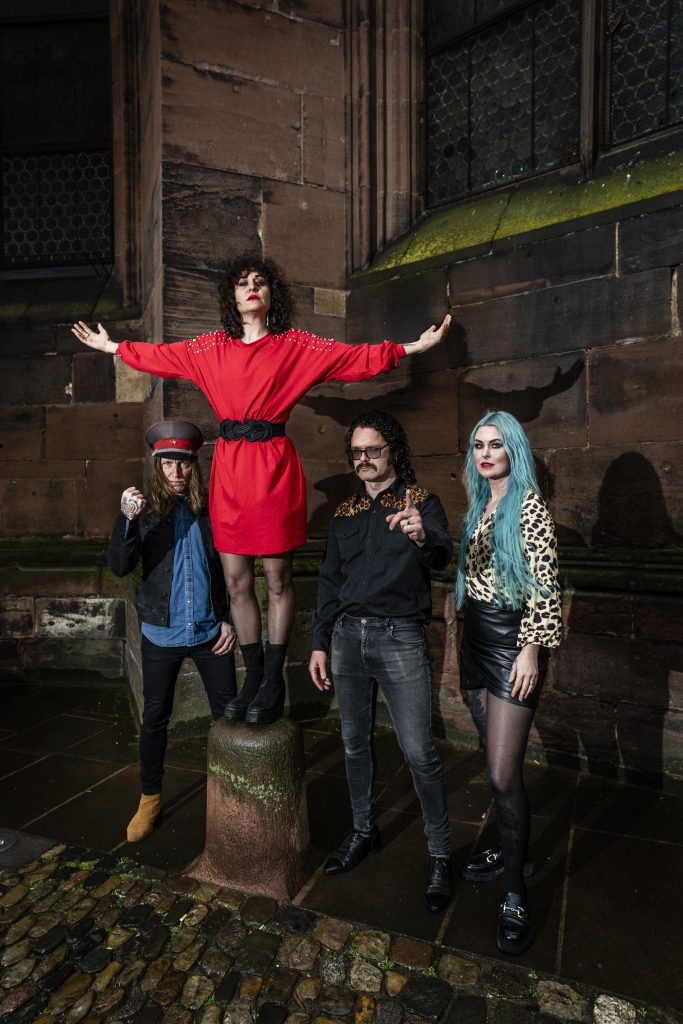
-You’re a Rock N Roll band, no question, so in a sense you’re entertainment but you clearly take a stand politically, too. Does this translate to your crowds or to the shows you book in any way?
Cecilia: I think that our crowds and our audience recognize that we have political opinions that we have to say. I mean, all people do. For us it’s what we like to write about when we write songs, because we don’t really find inspiring writing about, take love (laughs). So, it’s just like a natural topic for us. But the main goal with the band is not to be political or to be spokespersons for a political party; we just express our feelings and thoughts and ideology, because we like to write about that, it gives us energy. It’s where we find our will and our energy, and maybe our anger and lust to change things, and its investment in society. Yeah, that’s basically what we write about.
Frida: Our views on life.
-I do have following questions about it, because I was wondering if you find it hard to mix politics with this kind of party, cheerful atmosphere that you covey in your sound. Because sometimes it’s like heavyweight topics so you have to find the balance.
F: I think it’s kind of like life, you know, it’s both. It’s not serious all the time, you want to have fun also, and like you said we’re a Rock ‘n’ Roll band and we like to have fun with our audience.
C: Yeah, that’s maybe the main goal, that they [the crowd] come together and enjoy themselves and find the will and the energy to try change something or help someone, and that’s great of course.
-Yeah, in fact I’ve noticed that you have lines such as “I don’t wanna live my life alone and isolated” in this song, ‘Midnight’. Do you think we are somehow a little bit alienated? Do we need more communal efforts or even parties?
C: Human beings are not made to live on their own. I think it’s dangerous for us. It’s not good at all for our mental health. We people and humans depend on each other. We need a context, and to have a context –and to be happy- I believe that we need similar… I mean, a society won’t be a good society if some people are super poor and have nothing and they can’t afford to pay a rent while others have access to culture, capital…
F: Yeah, like equal… Uhm… I can’t come up with the word again (laughs).
-I perfectly get what you mean, we’re on the same page.
F: Also, we wrote that songs during the pandemic, and we were longing to get together with people and at times we felt, you know, too isolated. For a good reason of course, but we were kind of longing for it.
-Yeah, I spent the lockdown alone, with no one at home, so I totally know what you mean. Related with that; how are this kind of things in Sweden? Are there scenes that blend with social movements? Is there something there?
F: I think there’s a Punk scene that is doing well but then it’s kind of hard, because a lot of the small clubs are closing down, so it’s kind of hard to get to play. Now we did this tour in Sweden and we played with some younger bands. It’s really, really cool to see that the scene is alive.
C: I mean, it’s more difficult now, because when we were kids there were rehearsal rooms from the council that were cheap and that rarely exists anymore. And, as Frida says, all the small stages that are also for youth closed down, because there’s no economic interest, they don’t make enough money basically. So that’s what it is all about nowadays, what matters is how much…
-Yeah… Benefits, and not the people.
F: Yes, it’s much harder now.
-Yes, it’s the same over here.
C: In Sweden you need to be 18 years old to be able to go to a venue there they sell alcohol, so that means that everyone who is younger than 18 are cut out from the scene. And that’s a pity.
-I sometimes feel it’s getting harder to be a teenager in a city, for example. There are fewer options. Yes, it’s a pity. I’m gonna move on to questions about your latest album. I wanted to ask about the title and its meaning, because I sense there’s a lot of irony to it.
C: Yeah, you’re right. I mean, we are atheists in the band, so it’s not like we started to believe in God or anything. But it’s what you always say, or what leaders in the world usually say, they use that phrase to somehow legitimate themselves and what they do, “yeah, but I have God on my side”. A lot of times, when you hear someone saying, “God bless you all”, like Donald Trump for example, do you really want to be blessed by God through Donald Trump? No…
-No! (laughs)
C: Well, maybe some people do…
F: And, “God bless you all” it’s like all the corruption from the Church, from the leaders, from the people with power. Is it really something to believe in? Do you wanna be blessed by that? Some of those people take advantage on… I don’t know if it’s the right way to say it, but they take the people who are struggling because it’s easier to take advantage of that and capitalize on it.
-Yeah, it’s perfectly clear.
C: I mean, the Church is an institution of power, of course, but at the same time the Church is not all bad. They do a lot of good things, like…
F: With the refugees and…
C: …They take care of homeless people, immigrants… It’s not like we are criticizing everything about the Church. That is also a function of power, that you must…
-Yeah, they belong to bigger power structures that have effect on people. A bad effect. But then it’s another people helping each other. Well, in fact in the video that you filmed for the song ‘God Bless you all’ you [Cecilia] present yourself as some sort of religious leader -I guess it’s a play on the same things we’re talking about-, but do you think it works as some kind of metaphor too? Would you say there are some similarities between those roles and musicians when they present themselves on stage?
C: Yes!! Definitely!! For sure because, I mean, we could basically do whatever on stage and people would go like “wooaa” and then think “what the fuck did she say?” (laughs).
F: Yeah, we have a responsibility, for sure.
-Yeah, you get some power.
C: And you get that high… It’s the same towards a rock band or a football team or whatever. People also can of course obsess about that and be very aggressive toward other people for their taste in music or football team or soccer team or whatever it is. We try to play with that as well in the song and in the video, yes.
-And what’s your experience regarding that? Because you’re aware of this power, of this visibility. Do you consider it when you’re approaching new songs or new shows? Do you have any ideas on how to deal with that or have you had bad or weird experiences with people being hardcore about what you do?
C: People can always have their opinions and we are only people. We need to take responsibility for ourselves and our actions. Of course, that we’re aware of the fact that people look at us and value what we have to say and what we do, but at the same time I don’t wanna be like a role model. I’m not a perfect person. Far from it. I have many, many flaws and I’m not perfect at all. I don’t see myself as a good role model. It’s great if we’re able to inspire people or if people like what we do, of course, but somehow, we can only take responsibility for ourselves, nor for the others.
F: I think that depends on what you bring into the word “role model”, because for me –now I’m coming to another subject- when I was a teenage girl it was very important to have role models in music and role models that inspired me. So, in a way I think that we don’t see ourselves as role models, but that if we could be role models for little girls -because you don’t see that many women play and stuff like that- it’s a fantastic thing. We’re not perfect people, of course, but it’s nice that girls look at us and think “oh look, there are women who have kids –you don’t have to have kids, of course- doing their own thing”. You can be inspired by that.
-Yes, of course, it’s representation and seeing yourself in others.
F: In that sense, I’m more than happy to be a role model (laughs). In that sense. But, as Cecilia said, we’re not perfect people, no one is.
C: That’s what I meant a little bit. I mean, it’s nice to be an inspiration, but it’s a little bit weird, or dangerous or whatever when people put you on a pedestal and figure how they’re supposed to be. Maybe we’re not what you wanna be at all (laughs) but you like what we do on stage and with our music. But as Frida said, it depends on what you put in the word “role model”.
-Absolutely. So, connecting to what Frida was saying, we’ve noticed that you both have these “girls to the front” tattoos, which after all is a Riot Grrrl motto. Are you influenced by any feminist movements within music? If so, which ones and or which were your role models when you were younger?
F: (silence) Do you want to start with this one, Cecilia? (laughs). When I grew up, like I said, I was searching for it because it wasn’t that common. I guess Courtney Love was the first one that I saw, you know, putting her leg on the monitor and just screaming her lungs out, and I was like “wow!!! You can do that?!” That was a huge thing for me. And seeing Sean Yseult, the bass player in White Zombie, another great songwriter doing these heavy riffs is D’Arcy, from The Smashing Pumpkins, and of course Jennifer Finch from L7, Kathleen Hanna… Yeah, I could go on, but when that kind of… In the early 90s’ that was huge for me and what it showed you could do, it was like “wow”. By that time, I went to music high school and everyone was like “oh, you have to be a shredder, you have to be so good” and I was like “No! Fuck that! I just wanna rock!” (laughs)
-Not at all! (laughs)
F: So yeah, very influenced by that. It was kind like a mix between the grunge scene and the Riot Grrrl scene. It was kind of a mix, I guess.
C: I think that the Riot Grrrl 90s’ scene was very important to all females that grew up during that time, because it really redefined how you can be as a female and a woman or a girl. I mean; how to behave, what you’re allowed to do -that you can also take a big place in a masculine context-, what to wear, who to love… It was a lot of things that really came out of that, that were of course already somehow bubbling in society, but then it kind of exploded. But I think if you grew up in the early 90s’, you didn’t really miss that. It was a huge inspiration. I’m a little younger than Frida, so I didn’t really start looking after that, for me it was like “yeah, of course I can do that”, I never thought that I couldn’t.
F: And that’s nice. Then it means that it really changed something. Also, I have to say that it was super including of the queer movement, so it was not only females, but it was also very including.
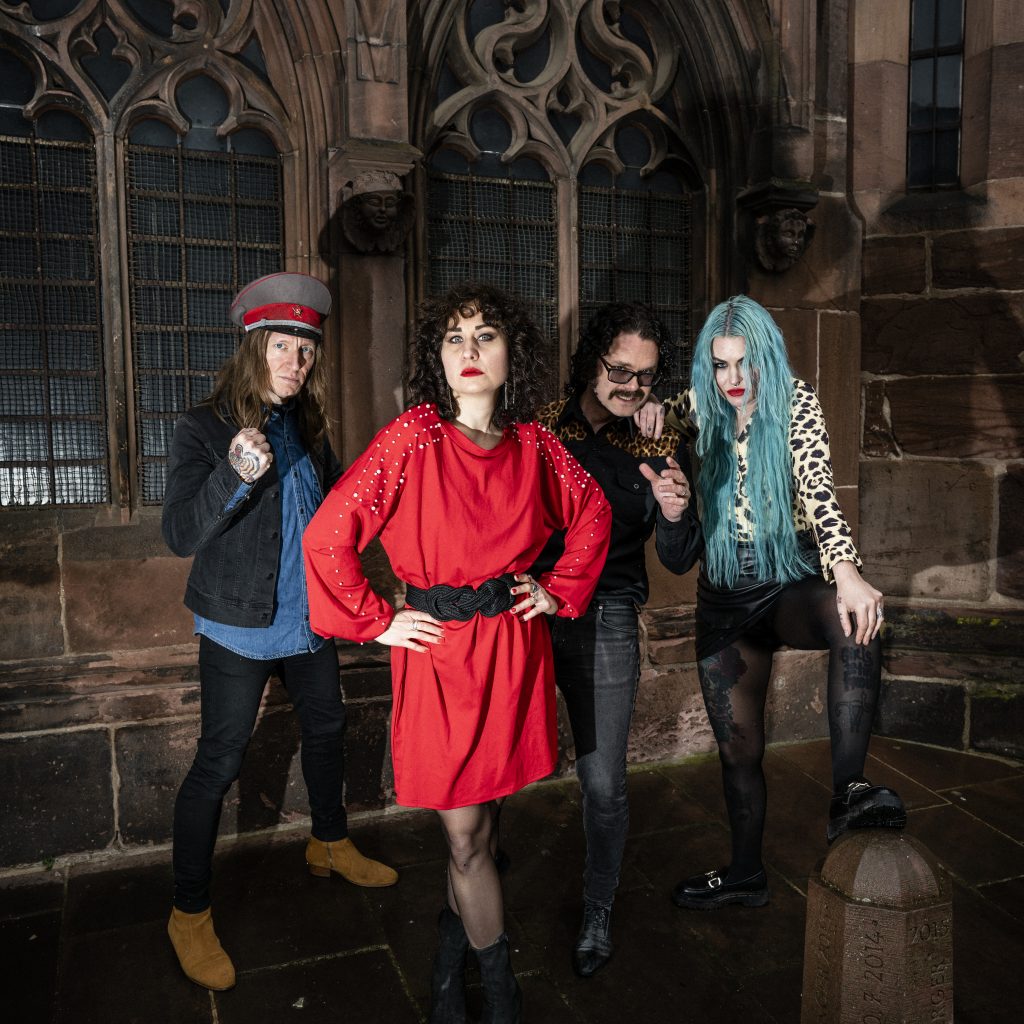
-Yes, I think it opened a few doors for people, so that’s important. That’s why I wanted to ask. Going back to you, I’d say you’re a band that belongs to the stage, would you agree?
C: Yeah, definitely. I mean, we are a live band, that’s where you can explore us or enjoy us the best, but I think we come out very good on recordings too (laughs).
-Yeah, obviously (laughs).
F: Yeah (laughs). But if you want the full experience I would say “go to a Baboon Show concert”.
-And after 10 albums and so many anthem-like and extremely catchy songs, is it easy to do your setlist? Because you have so many songs to choose from.
F: No, it’s hell.
–(laughs) That’s what I thought.
F: Especially for the summer festivals where you must play shorter sets… (shaking her head). It’s…No, no. And now we have the new songs too, so it’s not easy.
-Okay (laughs). Do you have any favourites?
F: Yes, and it’s hard when you have different favourites too (laughs).
-It gets more complicated.
F: Yes! (laughs).
–(laughs) OK, I won’t ask anything else about this. I won’t get into this.
F: It’s sensitive right now. No, I’m kidding (laughs).
-Tell me something about the cover you did of Eddie Meduza’s ‘Have a Party with me’. Why? How?
F: What can we say about that guy? He was just a crazy guy from Sweden, a very talented musician, but he got refused by labels and people would write really bad reviews and he just got flicked in the head. And then he started to write this really, weird songs that are so fun to listen to in the van or in the tour bus. But ‘Have a Party with me’ is…
C: It’s a bit more serious song by…
F: Yeah, it’s a bit more serious for being him. (laughs). And we thought “we could do a cover of that”.
C: And, since the pandemic we felt like it would fit to do something, because all people were longing to go out and enjoy themselves and meet people again, so we felt it could be a little bit of an anthem for, how to put it, post-Corona.
-Yeah, it’s a party song so it works for the excitement of getting out again.
C: But then it’s also important to point out, I think we did that in the video, we wrote something saying that it’s not super good to drink too much and party too much.
F: No because he [Eddie Meduza] died because of that.
C: It’s not all fun.
-Or it’s fun until it’s not, yeah.
F: (laughs) Yeah, exactly, it is fun until it’s not. True.
-You mentioned the pandemic. Was it hard for you as a band, as a live band? Was it hard to not play? Did you have plans that went to hell or was it relatively okay?
F: I think if the pandemic could happen in a good timing, it was a good timing for us. Because we had been touring a lot and our plan was to record the new album. Then the pandemic was a little bit too long (laughs) and we had to wait, so that’s why we released ‘I Never Say Goodnight’ and we wrote some more songs, because we felt we didn’t want to release an album and then nothing afterwards. But I mean, in the band we’re different people and we took the pandemic quite differently, I think.
C: Yeah, but of course it affected us. We couldn’t do what we love, you know, see our fans and play music, which we really love to do. I look back on it and I think we lost some energy, so we had to like to build up again. But at the same time for us COVID didn’t hit at a super bad time, because we weren’t planning a tour and we weren’t planning to release an album the next day. For us the pandemic came but the timing for the world was not good, the bands that released albums during the pandemic are gone. They just disappeared into it somehow.
-Yeah, I have some friends who put out an album and then the pandemic hit in like two days and they had to do another one and continue with that, and it’s kind of a shame. Yeah, that’s why I was asking.
F: And of course, when you’re used to tour a lot and you get the happiness, the adrenaline, the endorphins and then you’re used to meeting your audience, getting their vibes and you don’t get that, it really hits you.
-Yeah, there’s something big missing.
F. Yeah, but it was nice when we did some Corona concerts with a sitting audience.
-Oh, yes, I saw that on YouTube, and there was just one guy in the audience, is it possible?
F: Oh, no, that was another one. That was like a live stream with did in Sweden.
-I watched that, it’s cool.
C: It was fun actually, yeah.
F: Yeah, yeah. But the Corona concert when we… Was that in the Basque Country?
C: Yes.
– Where? I’m from the Basque Country originally.
C: It was in Vitoria-Gasteiz.
F: Everyone had to sit down, and they were like jumping in the chairs. It was so much fun.
C: Yeah, people really wanted to like “arrgg” and get up, but they were jumping in their chairs.
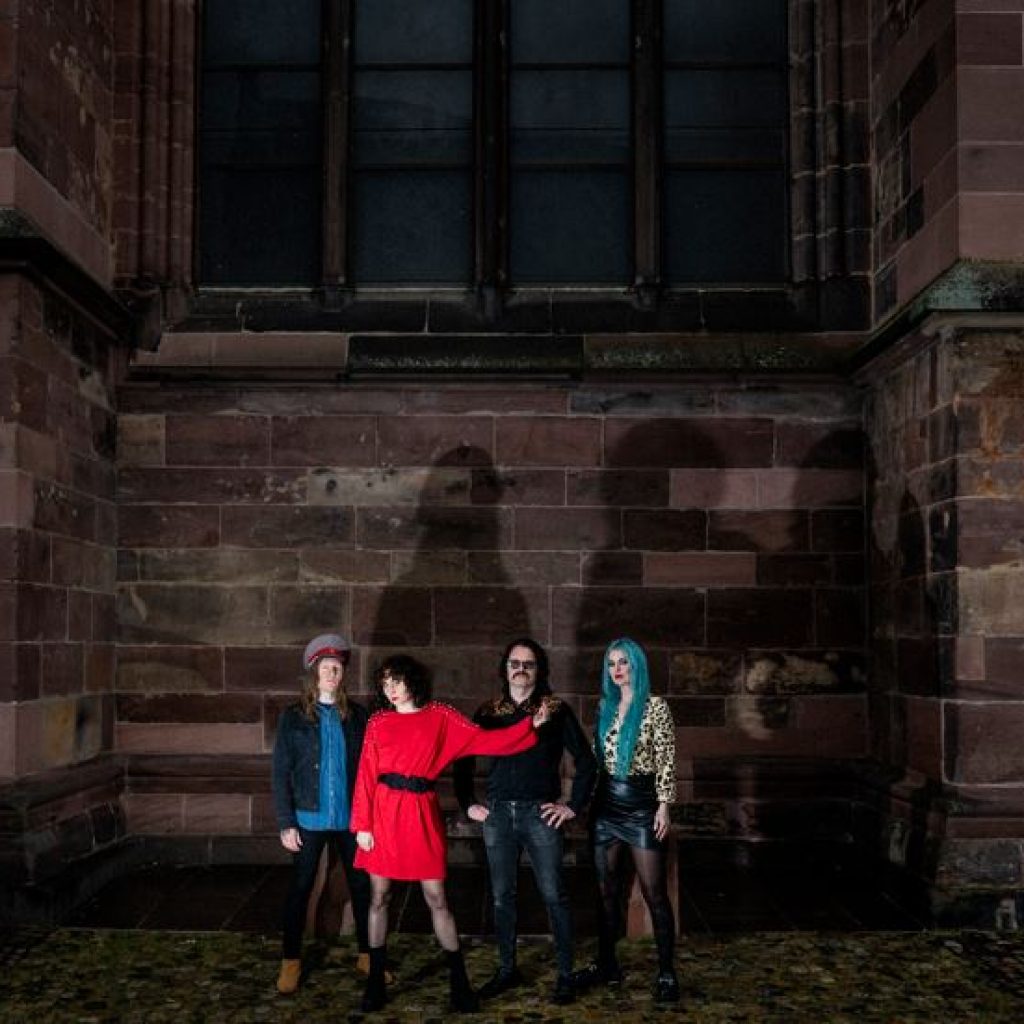
-Weird but fun. I have a last question, not related to any of this, but I’m also curious about your relationship with Cuba, because according to your own website you are a “socialistic band and have a special love for Cuba”. So how did you end up playing and recording there?
C: We had a Swedish label that was called National that put a festival in La Habana, in Cuba, so that’s why they took us there. This label doesn’t exist anymore, but it had like a socialistic culture. That’s how we got there. And then they started also to have some kind of collaboration with some Cuban musicians, so some of them also came to Sweden to play festivals. But I don’t think that collab exists anymore.
F: And then when we went there the last time, we also recorded the Havana sessions with some Cuban musicians. We really like the vibe there. Great times.
C: Also, in fact when you’re in a country and it’s pretty much the only one around there where you can walk to the beach without getting robbed or murdered, and you don’t have to be like at packed places… And that’s of course because they have a different system. So that’s also unique and amazing for us, who live in a totally capitalist society. It’s also very nice to be somewhere with no commercials telling you how you should look, what you should wear… You know, too fat, too thin, too short hair, too long hair… I don’t know… Everything about you it’s wrong all the time when you got outside the door at home. It’s weird because you get so much information about how stuff should be. And that’s kind of food for the soul.
F: Yeah, it was like cleansing from all the commercials and all that. It was nice.
-So, you could really feel the contrast.
F: Oh, yeah, yes.
C: Of course, they also have problems, nothing’s perfect, but if you compare what’s better… I mean, they are also poor there, but maybe not as poor as in Jamaica for example, and all kids go to school, they don’t have to sell drugs. I mean if you compare things… And it’s very interesting to have been able to see that.
F: And we’re so used to having everything all the time and we can choose like what kind of –now I don’t eat cheese, but I’ll say cheese- cheese I do want to eat. Do I want the French cheese? Do I want the cream cheese? No, you have like maybe two cheeses to choose from and that’s fine, they’re local. I remember when we were going to the breakfast and “we would like some coffee”, “no, the coffee comes on Thursdays, you have to wait for two days”, “OK! We’ll wait for the coffee”. We’re so used to having everything all the time in just a few seconds. It’s a different tempo.
-Yeah, it’s another rhythm.
F: We’re super spoiled, and that’s not good for the environment either, to have so many options all the time.
-Yes, and we’re also confusing that with freedom, which is not.
F: Exactly.
C: Yeah, the concept of freedom… That’s where most modern histories begin at.
-So that was all on my part, thank you very much, it was very interesting. Thank you!
F: Thank you!
C: Very nice talking to you!

